外研高一必修4 Module 3 Body Language and Non-Verbal Communication模块复习课件(58张)
文档属性
| 名称 | 外研高一必修4 Module 3 Body Language and Non-Verbal Communication模块复习课件(58张) | 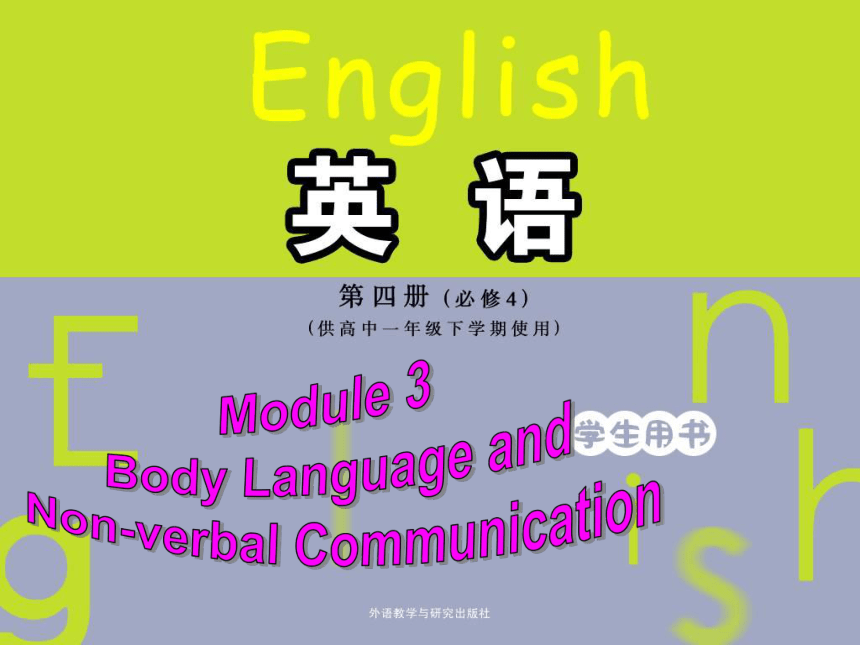 | |
| 格式 | zip | ||
| 文件大小 | 724.6KB | ||
| 资源类型 | 教案 | ||
| 版本资源 | 外研版 | ||
| 科目 | 英语 | ||
| 更新时间 | 2017-01-18 20:18:19 | ||
图片预览

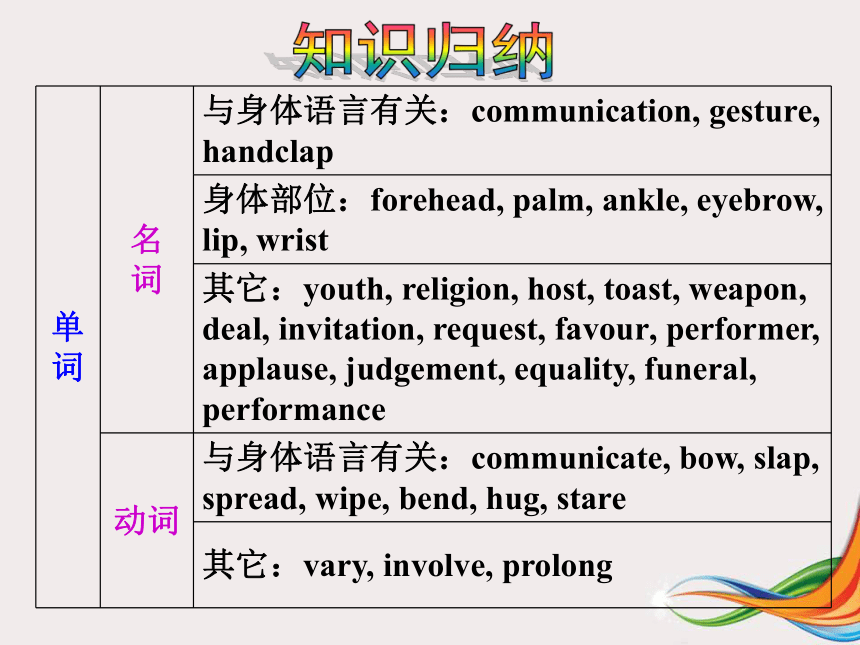

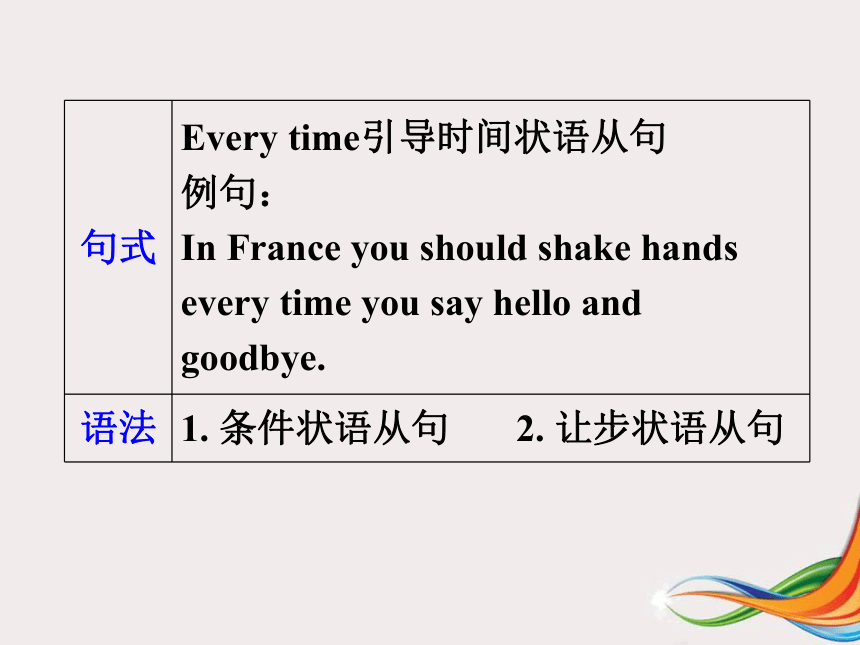
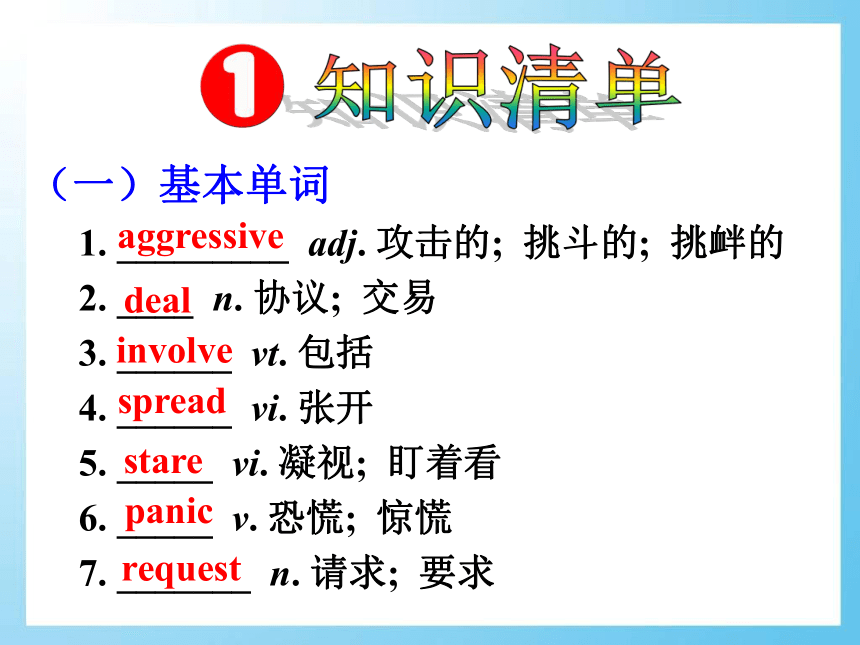

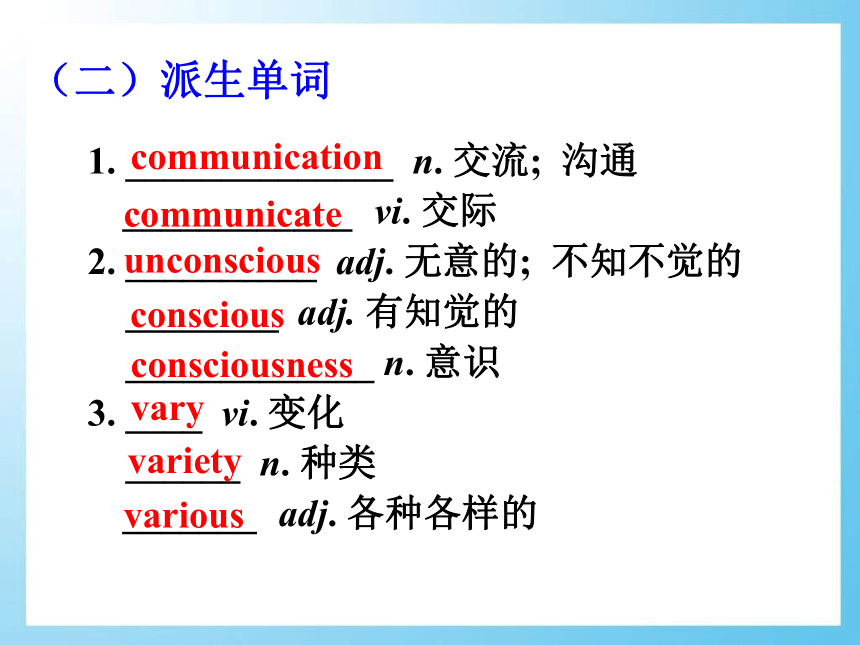
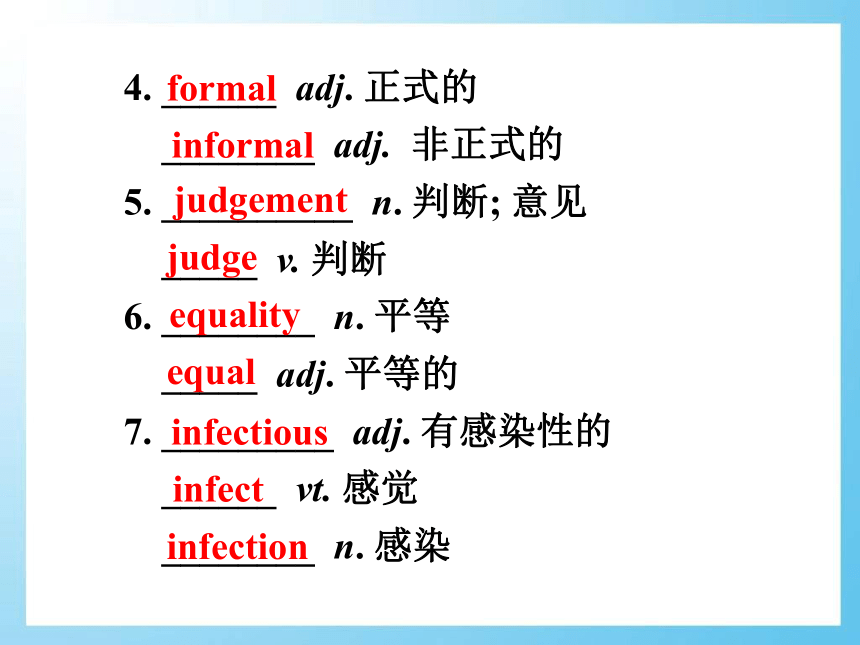
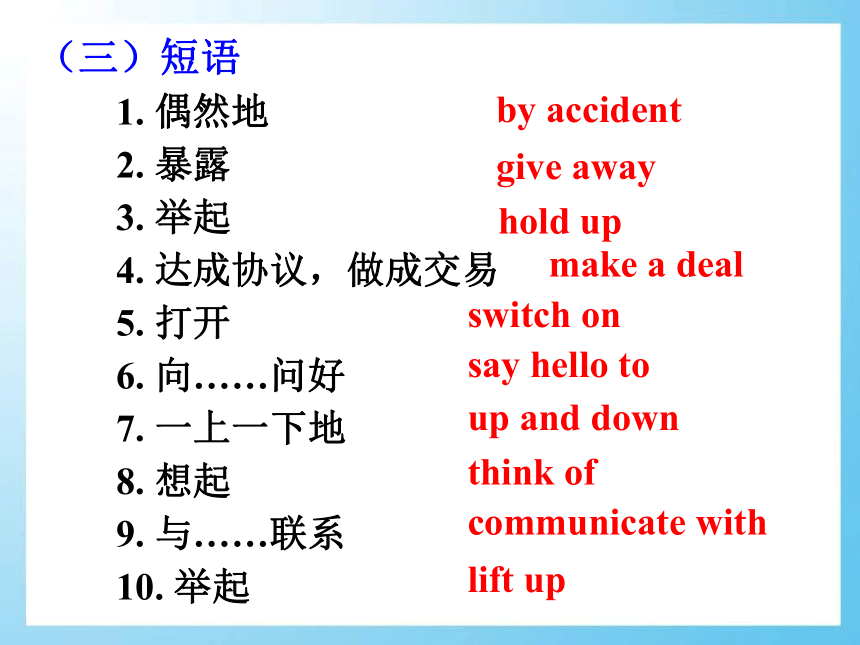
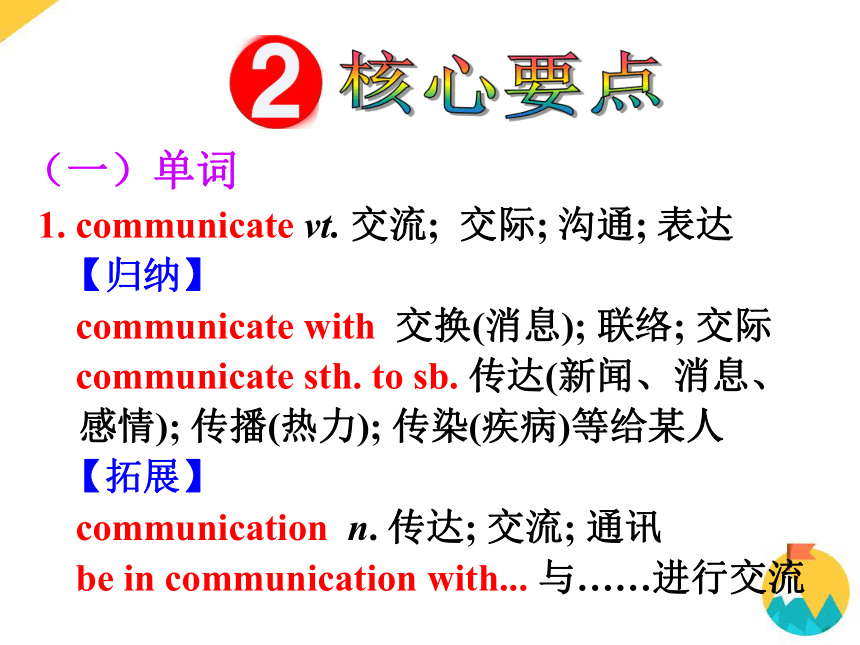

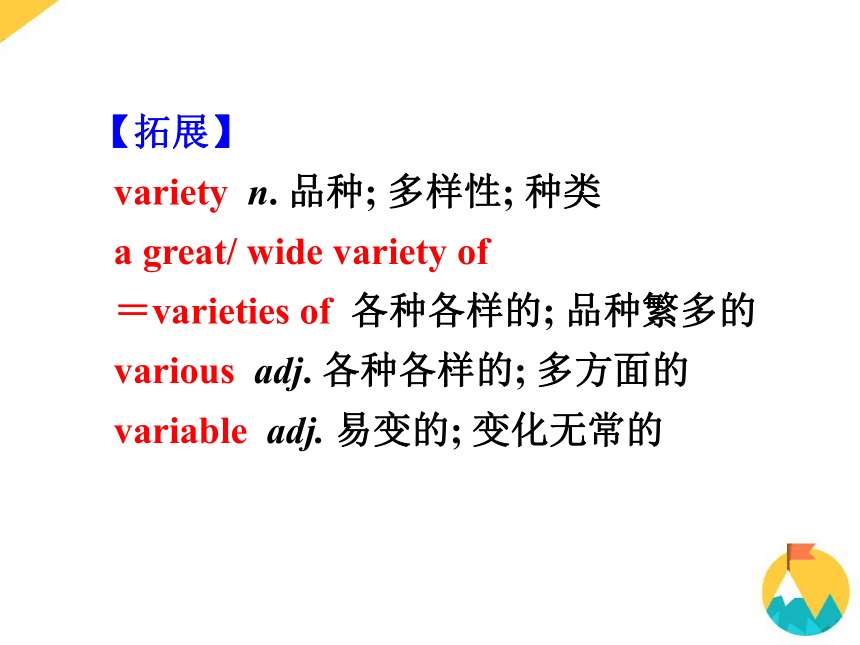
文档简介
课件58张PPT。Module 3
Body Language and
Non-verbal Communication知识归纳1. _________ adj. 攻击的; 挑斗的; 挑衅的
2. ____ n. 协议; 交易
3. ______ vt. 包括
4. ______ vi. 张开
5. _____ vi. 凝视; 盯着看
6. _____ v. 恐慌; 惊慌
7. _______ n. 请求; 要求知识清单(一)基本单词aggressivedealinvolvespreadstarepanicrequest8. _______ vt. 延长
9. _______ n. 武器
10. _______ n. 姿势
11. ___________ adj. 恐吓的; 有威胁的
12. ____ vi. 鞠躬
13. _____ vt. 弯下腰
14. _______ n. 宗教
15. _____ n. 恩惠; 善意的行为
16. _____ adj. 社会的
17. _______ n. 葬礼prolongweapongesturethreateningbowbendreligionfavorsocialfuneral1. ______________ n. 交流; 沟通
____________ vi. 交际
2. __________ adj. 无意的; 不知不觉的
________ adj. 有知觉的
_____________ n. 意识
3. ____ vi. 变化
______ n. 种类
_______ adj. 各种各样的(二)派生单词communicationcommunicateunconsciousconsciousconsciousnessvaryvarietyvarious4. ______ adj. 正式的
________ adj. 非正式的
5. __________ n. 判断; 意见
_____ v. 判断
6. ________ n. 平等
_____ adj. 平等的
7. _________ adj. 有感染性的
______ vt. 感觉
________ n. 感染formalinformaljudgementjudgeequalityequalinfectiousinfectinfection1. 偶然地
2. 暴露
3. 举起
4. 达成协议,做成交易
5. 打开
6. 向……问好
7. 一上一下地
8. 想起
9. 与……联系
10. 举起(三)短语by accidentgive awayhold upmake a dealswitch onsay hello toup and downthink ofcommunicate withlift up1. communicate vt. 交流; 交际; 沟通; 表达
【归纳】
communicate with 交换(消息); 联络; 交际
communicate sth. to sb. 传达(新闻、消息、感情); 传播(热力); 传染(疾病)等给某人
【拓展】
communication n. 传达; 交流; 通讯
be in communication with... 与……进行交流核心要点(一)单词2. vary vi. 变化
【归纳】
vary from... to... 由……到……变化不等
vary from 不同于……
vary with 随……而变化
vary in 在……方面不同,有差异【拓展】
variety n. 品种; 多样性; 种类
a great/ wide variety of
=varieties of 各种各样的; 品种繁多的
various adj. 各种各样的; 多方面的
variable adj. 易变的; 变化无常的3. involve vt. 包括,牵涉,使参与
【归纳】
involve sb. in (doing) sth.
把某人牵扯到某事里面; 使某人参与做某事
involve with... 和……有密切联系
be/get involved in 使卷入……之中
be involved with sb. 与某人联系在一起4. spread (spread, spread)
v. 展开; 铺开; 传播; 散开; 伸展; 延伸
n. 传播; 扩展
【归纳】
spread sth. on/ over sth.
把某物铺在……上
spread sth. with sth.
把某物涂在……上
spread out 展开; 张开; 扩大(张); 伸长5. stare vi. 凝视; 注视; 盯着看
【同类辨析】
stare at
好奇、敌视、傲慢而睁大眼睛凝视
glare at 怒视,瞪眼
glance at 匆匆一瞥
gaze at
兴趣、喜欢或惊奇而目不转睛地凝视
look at 看,看着6. request vt. 请求, 要求
n. 请求, 要求, 邀请
【归纳】
request sb. to do sth. 请求某人干某事
request sth. from/ of sb.
要求、请求某人做某事; 向某人要求某物
request that-clause
请求……(从句谓语动词用should+动词原形,should可以省略)make a request for...
要求……
at one’s request/ at the request of sb.
应某人之请求/要求
be in great request
有需求; 极需要
upon/on request
一经要求; 应……的要求7. live adj. 现场的; 活的; 通着电流的
e.g.
We watched a live television show.
We sell live fish.
Stay away. That wire is live.
The opening ceremony of 2010 Shanghai World Expo was televised live all over the world. 辨析live, alive, living
live 形容词,活着的,有生命的; 现场直播的。可作前置定语或表语。
living 活的,活着的; 现存的。可作前置定语和后置定语,也可作表语。
alive?活着的; (继续)存在的; 有活力的。可作表语、后置定语和宾语补足语。如:
Not only am I afraid of a live snake, but also a dead one will make me sick.
No man living could have done better.
Newspaper reports kept interest in the story alive.8. compete v. 竞争; 比赛
【归纳】
compete with/ against 与……竞争
compete for 为……而竞争
compete with sb. in…
在……方面与某人竞争
【拓展】
competition n. 竞争
competitor n. 参赛者
competitive adj. 有竞争性的9. favor n. 恩惠; 善意的行为
【归纳】
ask a favor of sb. 请某人帮忙
do a favor for sb. = do sb. a favor
帮助某人
in one’s favor 对某人有利; 受某人喜爱
in favor of 支持; 赞同
【拓展】
favorite adj. 最喜欢的 n. 喜欢的人或事
favorable adj. 赞成的; 有利的1. hold up 举起; 延误
【拓展】
hold back 阻挡,忍住,抑制
hold on 坚持; (电话用语)稍等,
不要挂断
hold out 维持; 抵抗
hold one’s breath 屏住呼吸(二)短语2. give away 暴露; 泄露; 分发或赠送某物
【拓展】
give back 归还; 恢复
give in 屈服; 让步
give off 散发; 放出
give out 分发; 用完; 耗尽; 发出
give way to 给……让路; 被……代替
give up 放弃3. make a deal 达成协议; 做成交易
【拓展】
a great/ good deal
(常接比较级)……得多
a great/ good deal of 大量(不可数)
deal with 处理; 安排; 涉及; 做买卖
deal in 经营
It’s a deal. 就这样定了。辨析deal with与do with
表示“处理,对待”时,在陈述句中可以互相替换。在特殊疑问句中,“怎么处理,怎么对待”时,do with与what连用,how与deal with连用。即do with中,do是及物动词,其后需接宾语; deal with中deal是不及物动词,其后不能接宾语。
e.g. What do you do with the difficulties you
face? =How do you deal with the
difficulties you face?I. 根据本模块所学单词及提示写出所缺单词的正确形式。
1. The teacher made a g______ of quiet
and the room grew still.
2. Nicky’s job as a public relations director
________ (包括) spending quite a lot of
time with other people.gesture?involves? ?3. His hands are big. When all his fingers are s______, they look like two big fans.
4. I like the fact that the children are learning about different cultures and ________ (宗教).
5. The organization seeks to ensure e_______ of pay for men and women.spread equalityreligions?II. 用括号内单词的正确形式填空。
1. There’s very little ______________ (communicate) between mother and daughter.
2. She said Denny had received a(n) ___________ (threat) letter and asked me if I sent it.
3. This was a very impressive ____________ (perform) by the young player.
4. It’s too soon to make a(n) ___________ (judge) about what the outcome will be.judgement communication?threateningperformance? ?III. 选用方框内合适的短语并用其正确形式填空(每个短语限用一次)。1. Hank pretended to be French, but his German accent _____ him _____.on guard, hold up, give away,
up and down, switch ongave away 2. If you want to use the machine, first you should ______ the machine ___.
3. The pupil ________ his hand to ask the teacher a question.
4. The police warned people to be ________ for thieves during the Christmas rush.
5. He got up and began to pace ____________ the room.up and downswitch on? ?held up on guard1. Perhaps more than I think.
也许比我想的要多。
more than 比……多; 多于
1) more than+名词 (动名词) “不仅仅是,
不只是”。
more than+数词 “超过,……以上”。
more than+形容词“非常,很”。
2) no more than 仅仅,不过
not more than 至多,不超过
more than a little 非常(三)句式 more than one... 不止一个……
more or less 差不多; 或多或少
3) more...than 是对于不同的人或物的同一性质或方面的比较,“比……更(比较级); 与其说……倒不如说……”。
e.g. He is no more a genius than I am.
Mr Smith is more a writer than
painter.辨析no more than与not more than
1) no more than=only,消极否定,“不过,
只有,仅仅”。
not more than=at most,“不超过,至多”。
e.g.
He has learned no more than 100 words.
He has learned not more than 100 words.
2) no more... than (not... any more than) 跟从句,表示两者皆否定,“不……正如……不……一样”。 e.g.
A nation can not exist without people any
more than a tree can grow without roots.
3) not more...than 跟从句,表示两者皆肯
定,只是有差别,“不及……那样”。
e.g. He is not more diligent than you are.2. But we don’t clap at the end of a television programme or a book, however good they are.
尽管一个电视节目或一本书很好,但是在它们结束时我们却不拍手鼓掌。
1) however “无论,不管”,后接形容词或副词,此时however引导一个让步状语从句,从句不倒装,但however后一定要紧接一个形容词或副词:however+adj./adv.+主+谓。
e.g. However late he went back home, his
mother was waiting for him.2) no matter+what/ who/ which/ where/ when/ how也可改为what/ who/ which/ where/ when/ how+ever的形式。
e.g. No matter who wants to visit the
museum, he must ask the teacher for
permission.
=Whoever wants to visit the museum,
he must ask the teacher for permission.3. Body language is fascinating for anyone to study.
每个人学起身势语来都是非常入迷。
不定式的主动表被动的一个句型“主语+系动词+性质形容词+不定式”。其中不定式在句中作状语,常用于该结构中的形容词有:easy, hard, difficult, interesting, heavy, pleasant, comfortable, dangerous等。
e.g. The article is difficult to understand.
The problem is hard to deal with.
The room is comfortable for me to live
in.语法条件状语从句和让步状语从句【归纳1】
1. 引导条件状语从句的关联词有if, unless, once, suppose, as long as, on condition that, supposing, providing/provided (that) 等。2. 条件状语从句可以表示普遍的状况、客观真理或某人的习惯,此时从句和主句通常都用一般现在时或一般过去时; 也可以表示将来有可能发生的事, 此时从句常用一般现在时表将来, 主句常用一般将来时。
e.g. If I went to Laura’s house, I usually
took some flowers.You’ll fail in French unless you work harder.
Once you get there, you’ll love it.
Suppose we miss the train, what will we do then?
We’ll go as long as the weather is good.
They will give us the money on condition that we pay it back within six months.
Supposing (that) you are wrong, what will you do then?
We’ll buy everything you produce, providing / provided (that) the price is right.【归纳2】
1. 引导让步状语从句的关联词有though / although, while, as, even though/if, “疑问词+ever”/“no matter+疑问词。
2. 其中, as引导让步状语从句时, 从句用部分倒装语序; even though引导的让步状语从句表示已经存在的状态, 而even if引导的让步状语从句则表示将来有可能发生的事; “疑问词+ever”引导让步状语从句时, 可替换为“no matter+疑问词”结构。Though / Although Ann was in poor health, she continued to carry out her duties.
While Jeffrey is never a big eater, he does eat a lot of snacks.
Try as she might, Sue couldn’t get the door open.
Even though Clark is 24 now, he’s still like a little child.
Whatever / No matter what I suggest, he always disagrees.
Wherever / No matter where you choose to live, there will always be disadvantages.选用方框内合适的关联词并用其正确形式完成下面短文(可重复选用)。however, if, whatever, even though, unlessDear kids,
Don’t be frightened, the world isn’t coming to an end. I am simply taking a bath. Don’t panic 1. ____ I’m not out right on time. Do not knock on the door to hear my voice. I promise that 2. ___________ you can’t see me, I am on the other side. I’m not digging an escape tunnel (地道) and running away. 3. ________ I said a while ago, I didn’t mean it.
4. ________ much I would like it, water does not make me forgetful. I remember who you are. 5. _____ you want to use ourIf ifeven thoughwhateverHowever??other bathroom but someone is in it, you will just have to wait. 6. ________ you have four feet and a tail, do not think of going outside to “water” the lawn (草坪).
7. ________ the house catches on fire, stay inside and keep the doors locked.
Be good. Entertain yourselves. Yes, you can do both at the same time. I’ll be out soon.UnlessUnless写作如何用英语回复邀请函
【写作任务】
假设你是李华,你的外国朋友Emily给你发来邮件,邀请你下周六晚上参加她的生日聚会。请你用英语回一封邮件,内容包括:1. 表示感谢;
2. 委婉拒绝(原因:下周五要去北京参加英语演讲比赛,周日才能返回);
3. 表达祝愿。
注意:
1) 词数100左右(邮件的格式已给出, 但不计
入总词数);
2) 可适当增加细节, 以使行文连贯。
Dear Emily,
___________________________________【写作指导】
1. 审题定调:
本写作要求回复邀请函。在接到某人的邀请函后, 需要回复表示接受或拒绝邀请:
①回复表示接受对方邀请时, 首先要表示感谢, 然后表示自己愿意接受邀请, 最后表达一下自己想参加这次活动的迫切心情;
②回复表示拒绝对方的邀请时, 也要首先表示感谢, 然后委婉说明拒绝的原因并表达自己的歉意, 最后表达自己对这次活动的祝愿。2. 确定主体内容:
邮件正文可分为三部分:
第一部分:表示感谢;
第二部分:委婉拒绝邀请,说明原因并
表达歉意;
第三部分:表达祝愿。
3. 确定人称、时态:
人称以第一人称为主; 时态以一般现在时和一般将来时为主。4. 常用表达:
Thank you very much for inviting me to ...
First of all, let me express my thanks to you for ...
I’d like to arrive on time. I think it would be nice and interesting.
I’d love to go, but I can’t because ...
I’m sorry I cannot ... I’m going to ...
I’m sorry for not being able to ...
I’m afraid I will not be able to ... because ...
I wish you all (have) a good time. 【参考范文】
Dear Emily,
First of all, thank you very much for inviting me to your birthday party next Saturday.
I’d love to go, but I can’t because I have to go to Beijing to take part in an English speech contest next Friday, and I won’t be
back until next Sunday. I am terribly sorryfor not being able to go to your birthday party, but I’ve already got a birthday present for you. I’ll bring it to you when I come back from Beijing and I’m sure you’ll love it.
Happy birthday to you and have a good time at your party!
Yours,
Li Hua巩固练习I. 根据括号内的提示翻译下列句子。
不管这任务有多么艰巨, 我们都要按时完成。(however)
However hard the task may be, we will finish it on time.2. 尽管我费了很大劲才叫醒他, 但鲍勃却坚持说他没睡着。(although)
Bob insisted that he was not asleep although
I had great difficulty in waking him up.
3. 只要不下雨, 我们就能玩。(as long as)
As long as it doesn’t rain we can play.
4. 我总是开着窗户睡觉, 除非天气非常冷才关上窗户。 (unless)
I always sleep with the window open unless
it’s really cold.II. 阅读下面材料,在空白处填入适当的内容(不多于3个单词)或括号内单词的正确形式。
????? Body language, which is 1. ____ form of non-verbal communication, is more often than not done unconsciously. Most people don’t think about what gestures they’re making with their hands or how far away they stand from the person they are talking to, and they 2. ________ (certain) can’tcertainlya?control certain things that happen 3. ____ their bodies, such as blushing.
But another form of non-verbal communication is under our control and done consciously, and that is 4. ______ we do with our 5. ___________ (appear). For example, wearing something 6. ____________ (fashion) could be saying “I’m cool”; wearing a suit could be saying “I’m 7. _____ charge” orin?towhatappearancefashionable“I should be taken seriously”. And many people wear clothes 8. ________ (make) them attractive.
For 9. _____ same reasons as clothes, of course, the make-up people put on their lips and eyebrows and the hairstyles they pay for may 10. _____________ (consider) as forms of non-verbal communication, as well. be consideredto make?the
Body Language and
Non-verbal Communication知识归纳1. _________ adj. 攻击的; 挑斗的; 挑衅的
2. ____ n. 协议; 交易
3. ______ vt. 包括
4. ______ vi. 张开
5. _____ vi. 凝视; 盯着看
6. _____ v. 恐慌; 惊慌
7. _______ n. 请求; 要求知识清单(一)基本单词aggressivedealinvolvespreadstarepanicrequest8. _______ vt. 延长
9. _______ n. 武器
10. _______ n. 姿势
11. ___________ adj. 恐吓的; 有威胁的
12. ____ vi. 鞠躬
13. _____ vt. 弯下腰
14. _______ n. 宗教
15. _____ n. 恩惠; 善意的行为
16. _____ adj. 社会的
17. _______ n. 葬礼prolongweapongesturethreateningbowbendreligionfavorsocialfuneral1. ______________ n. 交流; 沟通
____________ vi. 交际
2. __________ adj. 无意的; 不知不觉的
________ adj. 有知觉的
_____________ n. 意识
3. ____ vi. 变化
______ n. 种类
_______ adj. 各种各样的(二)派生单词communicationcommunicateunconsciousconsciousconsciousnessvaryvarietyvarious4. ______ adj. 正式的
________ adj. 非正式的
5. __________ n. 判断; 意见
_____ v. 判断
6. ________ n. 平等
_____ adj. 平等的
7. _________ adj. 有感染性的
______ vt. 感觉
________ n. 感染formalinformaljudgementjudgeequalityequalinfectiousinfectinfection1. 偶然地
2. 暴露
3. 举起
4. 达成协议,做成交易
5. 打开
6. 向……问好
7. 一上一下地
8. 想起
9. 与……联系
10. 举起(三)短语by accidentgive awayhold upmake a dealswitch onsay hello toup and downthink ofcommunicate withlift up1. communicate vt. 交流; 交际; 沟通; 表达
【归纳】
communicate with 交换(消息); 联络; 交际
communicate sth. to sb. 传达(新闻、消息、感情); 传播(热力); 传染(疾病)等给某人
【拓展】
communication n. 传达; 交流; 通讯
be in communication with... 与……进行交流核心要点(一)单词2. vary vi. 变化
【归纳】
vary from... to... 由……到……变化不等
vary from 不同于……
vary with 随……而变化
vary in 在……方面不同,有差异【拓展】
variety n. 品种; 多样性; 种类
a great/ wide variety of
=varieties of 各种各样的; 品种繁多的
various adj. 各种各样的; 多方面的
variable adj. 易变的; 变化无常的3. involve vt. 包括,牵涉,使参与
【归纳】
involve sb. in (doing) sth.
把某人牵扯到某事里面; 使某人参与做某事
involve with... 和……有密切联系
be/get involved in 使卷入……之中
be involved with sb. 与某人联系在一起4. spread (spread, spread)
v. 展开; 铺开; 传播; 散开; 伸展; 延伸
n. 传播; 扩展
【归纳】
spread sth. on/ over sth.
把某物铺在……上
spread sth. with sth.
把某物涂在……上
spread out 展开; 张开; 扩大(张); 伸长5. stare vi. 凝视; 注视; 盯着看
【同类辨析】
stare at
好奇、敌视、傲慢而睁大眼睛凝视
glare at 怒视,瞪眼
glance at 匆匆一瞥
gaze at
兴趣、喜欢或惊奇而目不转睛地凝视
look at 看,看着6. request vt. 请求, 要求
n. 请求, 要求, 邀请
【归纳】
request sb. to do sth. 请求某人干某事
request sth. from/ of sb.
要求、请求某人做某事; 向某人要求某物
request that-clause
请求……(从句谓语动词用should+动词原形,should可以省略)make a request for...
要求……
at one’s request/ at the request of sb.
应某人之请求/要求
be in great request
有需求; 极需要
upon/on request
一经要求; 应……的要求7. live adj. 现场的; 活的; 通着电流的
e.g.
We watched a live television show.
We sell live fish.
Stay away. That wire is live.
The opening ceremony of 2010 Shanghai World Expo was televised live all over the world. 辨析live, alive, living
live 形容词,活着的,有生命的; 现场直播的。可作前置定语或表语。
living 活的,活着的; 现存的。可作前置定语和后置定语,也可作表语。
alive?活着的; (继续)存在的; 有活力的。可作表语、后置定语和宾语补足语。如:
Not only am I afraid of a live snake, but also a dead one will make me sick.
No man living could have done better.
Newspaper reports kept interest in the story alive.8. compete v. 竞争; 比赛
【归纳】
compete with/ against 与……竞争
compete for 为……而竞争
compete with sb. in…
在……方面与某人竞争
【拓展】
competition n. 竞争
competitor n. 参赛者
competitive adj. 有竞争性的9. favor n. 恩惠; 善意的行为
【归纳】
ask a favor of sb. 请某人帮忙
do a favor for sb. = do sb. a favor
帮助某人
in one’s favor 对某人有利; 受某人喜爱
in favor of 支持; 赞同
【拓展】
favorite adj. 最喜欢的 n. 喜欢的人或事
favorable adj. 赞成的; 有利的1. hold up 举起; 延误
【拓展】
hold back 阻挡,忍住,抑制
hold on 坚持; (电话用语)稍等,
不要挂断
hold out 维持; 抵抗
hold one’s breath 屏住呼吸(二)短语2. give away 暴露; 泄露; 分发或赠送某物
【拓展】
give back 归还; 恢复
give in 屈服; 让步
give off 散发; 放出
give out 分发; 用完; 耗尽; 发出
give way to 给……让路; 被……代替
give up 放弃3. make a deal 达成协议; 做成交易
【拓展】
a great/ good deal
(常接比较级)……得多
a great/ good deal of 大量(不可数)
deal with 处理; 安排; 涉及; 做买卖
deal in 经营
It’s a deal. 就这样定了。辨析deal with与do with
表示“处理,对待”时,在陈述句中可以互相替换。在特殊疑问句中,“怎么处理,怎么对待”时,do with与what连用,how与deal with连用。即do with中,do是及物动词,其后需接宾语; deal with中deal是不及物动词,其后不能接宾语。
e.g. What do you do with the difficulties you
face? =How do you deal with the
difficulties you face?I. 根据本模块所学单词及提示写出所缺单词的正确形式。
1. The teacher made a g______ of quiet
and the room grew still.
2. Nicky’s job as a public relations director
________ (包括) spending quite a lot of
time with other people.gesture?involves? ?3. His hands are big. When all his fingers are s______, they look like two big fans.
4. I like the fact that the children are learning about different cultures and ________ (宗教).
5. The organization seeks to ensure e_______ of pay for men and women.spread equalityreligions?II. 用括号内单词的正确形式填空。
1. There’s very little ______________ (communicate) between mother and daughter.
2. She said Denny had received a(n) ___________ (threat) letter and asked me if I sent it.
3. This was a very impressive ____________ (perform) by the young player.
4. It’s too soon to make a(n) ___________ (judge) about what the outcome will be.judgement communication?threateningperformance? ?III. 选用方框内合适的短语并用其正确形式填空(每个短语限用一次)。1. Hank pretended to be French, but his German accent _____ him _____.on guard, hold up, give away,
up and down, switch ongave away 2. If you want to use the machine, first you should ______ the machine ___.
3. The pupil ________ his hand to ask the teacher a question.
4. The police warned people to be ________ for thieves during the Christmas rush.
5. He got up and began to pace ____________ the room.up and downswitch on? ?held up on guard1. Perhaps more than I think.
也许比我想的要多。
more than 比……多; 多于
1) more than+名词 (动名词) “不仅仅是,
不只是”。
more than+数词 “超过,……以上”。
more than+形容词“非常,很”。
2) no more than 仅仅,不过
not more than 至多,不超过
more than a little 非常(三)句式 more than one... 不止一个……
more or less 差不多; 或多或少
3) more...than 是对于不同的人或物的同一性质或方面的比较,“比……更(比较级); 与其说……倒不如说……”。
e.g. He is no more a genius than I am.
Mr Smith is more a writer than
painter.辨析no more than与not more than
1) no more than=only,消极否定,“不过,
只有,仅仅”。
not more than=at most,“不超过,至多”。
e.g.
He has learned no more than 100 words.
He has learned not more than 100 words.
2) no more... than (not... any more than) 跟从句,表示两者皆否定,“不……正如……不……一样”。 e.g.
A nation can not exist without people any
more than a tree can grow without roots.
3) not more...than 跟从句,表示两者皆肯
定,只是有差别,“不及……那样”。
e.g. He is not more diligent than you are.2. But we don’t clap at the end of a television programme or a book, however good they are.
尽管一个电视节目或一本书很好,但是在它们结束时我们却不拍手鼓掌。
1) however “无论,不管”,后接形容词或副词,此时however引导一个让步状语从句,从句不倒装,但however后一定要紧接一个形容词或副词:however+adj./adv.+主+谓。
e.g. However late he went back home, his
mother was waiting for him.2) no matter+what/ who/ which/ where/ when/ how也可改为what/ who/ which/ where/ when/ how+ever的形式。
e.g. No matter who wants to visit the
museum, he must ask the teacher for
permission.
=Whoever wants to visit the museum,
he must ask the teacher for permission.3. Body language is fascinating for anyone to study.
每个人学起身势语来都是非常入迷。
不定式的主动表被动的一个句型“主语+系动词+性质形容词+不定式”。其中不定式在句中作状语,常用于该结构中的形容词有:easy, hard, difficult, interesting, heavy, pleasant, comfortable, dangerous等。
e.g. The article is difficult to understand.
The problem is hard to deal with.
The room is comfortable for me to live
in.语法条件状语从句和让步状语从句【归纳1】
1. 引导条件状语从句的关联词有if, unless, once, suppose, as long as, on condition that, supposing, providing/provided (that) 等。2. 条件状语从句可以表示普遍的状况、客观真理或某人的习惯,此时从句和主句通常都用一般现在时或一般过去时; 也可以表示将来有可能发生的事, 此时从句常用一般现在时表将来, 主句常用一般将来时。
e.g. If I went to Laura’s house, I usually
took some flowers.You’ll fail in French unless you work harder.
Once you get there, you’ll love it.
Suppose we miss the train, what will we do then?
We’ll go as long as the weather is good.
They will give us the money on condition that we pay it back within six months.
Supposing (that) you are wrong, what will you do then?
We’ll buy everything you produce, providing / provided (that) the price is right.【归纳2】
1. 引导让步状语从句的关联词有though / although, while, as, even though/if, “疑问词+ever”/“no matter+疑问词。
2. 其中, as引导让步状语从句时, 从句用部分倒装语序; even though引导的让步状语从句表示已经存在的状态, 而even if引导的让步状语从句则表示将来有可能发生的事; “疑问词+ever”引导让步状语从句时, 可替换为“no matter+疑问词”结构。Though / Although Ann was in poor health, she continued to carry out her duties.
While Jeffrey is never a big eater, he does eat a lot of snacks.
Try as she might, Sue couldn’t get the door open.
Even though Clark is 24 now, he’s still like a little child.
Whatever / No matter what I suggest, he always disagrees.
Wherever / No matter where you choose to live, there will always be disadvantages.选用方框内合适的关联词并用其正确形式完成下面短文(可重复选用)。however, if, whatever, even though, unlessDear kids,
Don’t be frightened, the world isn’t coming to an end. I am simply taking a bath. Don’t panic 1. ____ I’m not out right on time. Do not knock on the door to hear my voice. I promise that 2. ___________ you can’t see me, I am on the other side. I’m not digging an escape tunnel (地道) and running away. 3. ________ I said a while ago, I didn’t mean it.
4. ________ much I would like it, water does not make me forgetful. I remember who you are. 5. _____ you want to use ourIf ifeven thoughwhateverHowever??other bathroom but someone is in it, you will just have to wait. 6. ________ you have four feet and a tail, do not think of going outside to “water” the lawn (草坪).
7. ________ the house catches on fire, stay inside and keep the doors locked.
Be good. Entertain yourselves. Yes, you can do both at the same time. I’ll be out soon.UnlessUnless写作如何用英语回复邀请函
【写作任务】
假设你是李华,你的外国朋友Emily给你发来邮件,邀请你下周六晚上参加她的生日聚会。请你用英语回一封邮件,内容包括:1. 表示感谢;
2. 委婉拒绝(原因:下周五要去北京参加英语演讲比赛,周日才能返回);
3. 表达祝愿。
注意:
1) 词数100左右(邮件的格式已给出, 但不计
入总词数);
2) 可适当增加细节, 以使行文连贯。
Dear Emily,
___________________________________【写作指导】
1. 审题定调:
本写作要求回复邀请函。在接到某人的邀请函后, 需要回复表示接受或拒绝邀请:
①回复表示接受对方邀请时, 首先要表示感谢, 然后表示自己愿意接受邀请, 最后表达一下自己想参加这次活动的迫切心情;
②回复表示拒绝对方的邀请时, 也要首先表示感谢, 然后委婉说明拒绝的原因并表达自己的歉意, 最后表达自己对这次活动的祝愿。2. 确定主体内容:
邮件正文可分为三部分:
第一部分:表示感谢;
第二部分:委婉拒绝邀请,说明原因并
表达歉意;
第三部分:表达祝愿。
3. 确定人称、时态:
人称以第一人称为主; 时态以一般现在时和一般将来时为主。4. 常用表达:
Thank you very much for inviting me to ...
First of all, let me express my thanks to you for ...
I’d like to arrive on time. I think it would be nice and interesting.
I’d love to go, but I can’t because ...
I’m sorry I cannot ... I’m going to ...
I’m sorry for not being able to ...
I’m afraid I will not be able to ... because ...
I wish you all (have) a good time. 【参考范文】
Dear Emily,
First of all, thank you very much for inviting me to your birthday party next Saturday.
I’d love to go, but I can’t because I have to go to Beijing to take part in an English speech contest next Friday, and I won’t be
back until next Sunday. I am terribly sorryfor not being able to go to your birthday party, but I’ve already got a birthday present for you. I’ll bring it to you when I come back from Beijing and I’m sure you’ll love it.
Happy birthday to you and have a good time at your party!
Yours,
Li Hua巩固练习I. 根据括号内的提示翻译下列句子。
不管这任务有多么艰巨, 我们都要按时完成。(however)
However hard the task may be, we will finish it on time.2. 尽管我费了很大劲才叫醒他, 但鲍勃却坚持说他没睡着。(although)
Bob insisted that he was not asleep although
I had great difficulty in waking him up.
3. 只要不下雨, 我们就能玩。(as long as)
As long as it doesn’t rain we can play.
4. 我总是开着窗户睡觉, 除非天气非常冷才关上窗户。 (unless)
I always sleep with the window open unless
it’s really cold.II. 阅读下面材料,在空白处填入适当的内容(不多于3个单词)或括号内单词的正确形式。
????? Body language, which is 1. ____ form of non-verbal communication, is more often than not done unconsciously. Most people don’t think about what gestures they’re making with their hands or how far away they stand from the person they are talking to, and they 2. ________ (certain) can’tcertainlya?control certain things that happen 3. ____ their bodies, such as blushing.
But another form of non-verbal communication is under our control and done consciously, and that is 4. ______ we do with our 5. ___________ (appear). For example, wearing something 6. ____________ (fashion) could be saying “I’m cool”; wearing a suit could be saying “I’m 7. _____ charge” orin?towhatappearancefashionable“I should be taken seriously”. And many people wear clothes 8. ________ (make) them attractive.
For 9. _____ same reasons as clothes, of course, the make-up people put on their lips and eyebrows and the hairstyles they pay for may 10. _____________ (consider) as forms of non-verbal communication, as well. be consideredto make?the
